-
THE GUILTY/DEN SKYDIGE (Gustav M÷ller 2017)
GUSTAV MÍLLER: THE GUILTY /DEN SKYDIGE(2017)
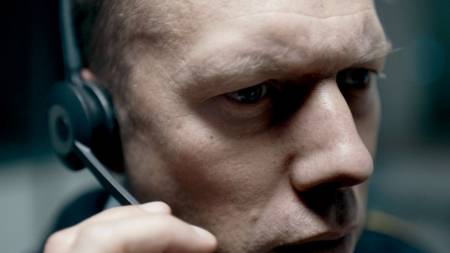
JAKOB CEDERGREN IN THE GUILTY
Tense, absorbing Danish police emergency call drama marks a "crackerjack feature debut"
The Guilty was reported on earlier in Filmleaf's 2018 Sundance thread: you can read Mike D'Angelo's Letterboxd review that says M÷ller does "a solid if unremarkable job of sustaining visual interest while confined to a single bland location, and generates considerable suspense from noises heard tinnily through the protagonist's earpiece." They aren't heard all that tinnily, though: the auxiliary soundtrack is as full throated as it needs to be to enrich the mainly one-person drama.
An accomplished, spare tour-de-force, all the action concerning a crisis confined to a police office call station and one man, a demoted officer struggling to save a woman being abducted by her ex-husband. D'Angelo confesses to finding aspects of the story implausible, and going back and forth on the film but with a positive conclusion overall: "Thought M÷ller had won me back over at the end, but then he adds a cheap additional misdirection (for which I did not fall), and I got annoyed at the contrivance again. Crackerjack feature debut, though." It has been bought by Magnolia, and it got the Sundance World Cinema Audience Award. Also reviewed in Variety, Hollywood Reporter, The Village Voice, The Verge, and other publications.
This film invites comparison with Tom Hardy in Stephen Knight's 2013 Locke as a telephone tour-de-force. Anything like this is like a radio play, not at all a bad association: radio plays used to be wonderful and they stimulate the imagination more than TV or movies.
Actually Locke is in some ways more limited and others richer. Both are excellent dramas. While The Guilty plunges us in the effort of phone emergencies duty cop Asgar (Jakob Cedergren) to save a woman who has been abducted by her ex-husband in his van, Locke, while suspenseful too - that's the nature of the genre - is more a character study from the start. Tom Hardy's protagonist is a wrongdoer, like Asgar, the cop suspended from street duty with his partner Rashid (Omar Shargawi) pending a court hearing tomorrow. And tomorrow is initiation of the biggest project of architect Locke's career, which involves laying foundations for large buildings, and it has to be run by his assistant because he must go to a London hospital for the birth of his child - to a woman not his wife. He's expected at home tonight to be with his family to watch an important football match, and he won't be there either. His effort to juggle all these things and keep them from tumbling down on him is the nail-biter.
In the juggling of multiple valences the Hardy vehicle - which one can't imagine working without him - resembles the stage play Michael Shannon did in 2011 about the failing theatrical agent, Mistakes Were Made. All these works are a matter of juggling multiple strands around a single main speaker on the phone (or phones) in front of us and keeping our attention riveted. They are all portraits of the man.
Asgar becomes desperate to save Iben (Jessica Dinnage), the abducted wife, from Michael (Johan Olsen) but doesn't know the location of his van, only the district (New Zealand, Copenhagen). And that's not all he doesn't know. In this respect, The Guilty is more single minded, simple, and focused on a single set of events than the other two stories. It also seems, somehow, more "real." When watching Shannon and the arguably even more gifted Hardy I was constantly repeating to myself, "Wow, isn't this guy talented!" WithThe Guilty, I was not. This is a tribute to the scenario as well as to Jakob Cedergren's acting, which allows him to disappear into the part of Asgar, to keep it from feeling like an aria.
Guilty/Der Skyldige, 85 mins., debuted Jan. 2018 at Sundance; it was also sown at Rotterdam, G÷teberg and Sun Valley, and it was screened for this review as part of the MoMA-Film Society of Lincoln Center series New Directors/New Films Mar. 2018. This is M÷ller's first feature; in 2015 he made a 28-min. short film about a woman seeking to leave a closed psychiatric ward.
ND/NF showtimes:
Friday, March 30, 6:00pm [MoMA]
Saturday, March 31, 6:30pm [FSLC]]
Last edited by Chris Knipp; 02-24-2019 at 12:33 PM.
-
AZOUGUE NAZARE (Tiago Melo 2017)
TIAGO MELO: AZOUGUE NAZARE (2017)
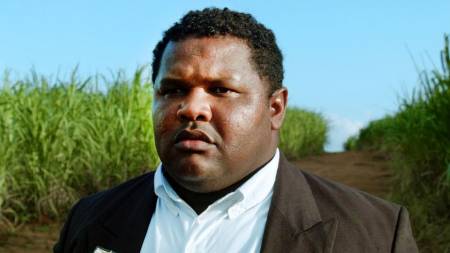
VALMIR DO COCO IN ASOUGUE NAZARE
A drama of popular clashes between Christian and more primitive satanic rituals in Brazil is colorful but a bit rough
Reviewed at Rotterdam in Hollywood Reporter by Neil Young, who explains the basics - how Azougue Nazare shows cultures clashing "with a reverberant clang" in this "promisingy energetic" - emphasis on "promisingly" - first feature. Specifically the conflict is between annual spectacles of a primitive tribal nature and the local Pernambuco (in NW Brazil) strain of evangelical Christianity.
The special element is Maracatu, a local tradition of an elaborately costumed celebration like the Mardi Gras Carnival, and based on roots in Brazil's time of slavery. The trouble is Tiago Melo wrangles his authentic local performers and musicians with unequal skill, and fails to develop the Christian evangelical side as clearly, or integrate his various subplots, which include a pretty young woman who wants to leave her locksmith husband, and a major performer in Maracatu, a big fat black man (Valmir do Coco), whose wife wants to have a baby by her elderly evangelical minister because a dream has told her so.
It's nice ironic twist, if filmmaker TIago Melo were as good as telling a story as Marcel Camus of the classic 1959 film Black Orpheus. But then, Camus had beautiful local stars (the Orpheus was a champion footballer) and a Greek myth. Even Carlos Diegues' updated 1999 local version of Camus's film, Orpheu, though beautiful, could not quite capture the earlier film's magic. Nothing in Azougue Nazare develops that kind of emotional power; only two peripheral actors are attractive, and there is no clear and unified central story. Neil Young acknowledges some of the cast of Melo's movie "are not the most gifted of thespians," but neither is Melo the most gifted of writer-editors. This is colorful indeed, but all pretty rough.
Azougue Nazarre, 80 mins., debuted at Rotterdam, where it won the Bright Future prize. It was screened for this review as part of the Mar. 28-Apr. 8, 2018 Museum of Modern Art-Film Society of Lincoln Center joint series, New Directors/New Films.
ND/NF showtimes:
Friday, March 30, 6:30pm [FSLC]
Saturday, March 31, 7:30pm [MoMA]
Last edited by Chris Knipp; 03-13-2018 at 09:14 PM.
-
UNTIL THE BIRDS RETURN/EN ATTENDANT LES HIRONDELLES (Karim Moussaoui 2017)
KARIM MOUSSAOUI: UNTIL THE BIRDS RETURN/EN ATTENDANT LES HIRONDELLES (2017)
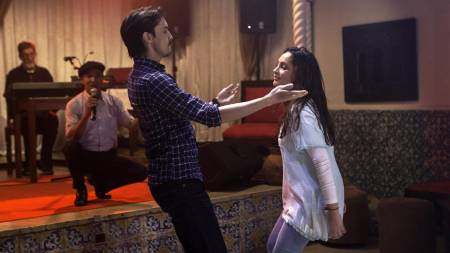
MEHDI RAMDANI AND HANIA AMAR IN UNTIL THE BIRDS RETURN
Fitting in and standing out in the Maghreb
The Maghreb countries, Algeria, Tunisia, and Morocco, have been so deeply influenced by outside cultures that their inhabitants suffer sometimes from split personalities. The title of Karim Moussaoui's debut feature even has a, to us, secret Arabic title. While its French and English names refer poetically to birds, the Arabic more prosaic one is "طبيعة الحال" (ṭabi'at al-ḥāl) or "The Nature of the Situation."
The film is also split into three unrelated segments, which shift back and forth between European influence and local in style and content. The first one shows a property developer whose spacious apartment, shared with his wife, would be elegant and sophisticated in Paris. Their conversations shift back and forth between French and Algerian Arabic in every sentence. When he speaks to his somewhat lazy son to urge him not to give up pursuing medicine, they speak mostly in Arabic. When he speaks later with his stylish daughter who has studied in France and vows to go back there ("It's too complicated here"), they speak only in French, with not a word of Arabic.
When the developer gets caught on a diversion road, he witnesses the violent beating of a man, about which he can do nothing. His alienation from it is shown by the fact that he never even reports it to the police after his flat tire has been fixed and he has come home. Along that deserted road are rows and rows of empty new buildings evidently never completed like many one can see in Cairo since the time of Sadat.
The second segment, with its attractive, alienated couple, might evoke Antonioni. They wind up on a long drive cross country, and are ex lovers. She is now promised to another, but they drift back together. They go to a big empty nightclub where she persuades musicians to play and reveals herself to be an excellent belly dancer. He reluctantly joins in. Later they encounter a lively group of musicians (Ra´na Ra´) whose playing might suggest the folklore-rock blend of the famous Moroccan group, Nass El Ghiwan.
The final segment brings up old ugly memories when a well-respected doctor is accused by a woman living in a shanty town of complicity in her mass rape during the revolution. And her son, too metaphorically for words, is a mute boy who cannot bear to be touched and speaks only in high-pitched, plaintive cries. This will haunt the doctor. But this episode too is invaded by lively local music, this time when the doctor is involved in a wedding. Instead of the spacious French-style apartment of the property developer, or the wide spaces of the car trip, the screen is filled with the oppressive, cacophonous celebration of a typical folkloric Magrebi wedding, and we can't say if the big doctor's jaunty dancing and forced smile convince anyone.
How does all this fit together? It doesn't. But while there is a kind of sympathetic fallacy in making work that exhibits the flaws one's trying to describe, the filmmaker shows skill as a storyteller and creator of mood.
Reviewed in Hollywood Reporter at Cannes by Jordan Mintzer ("An intriguingly crafted look at contemporary Algeria"), who described the film as bringing together the country's "troubles both past and present" by exploring " the damaged emotional landscape of his homeland." Cannes critics compared Moussaoui's style to Abbas Kiarostami and Leos Carax.
"Separated into three stories that are less connected than they are complementary," Mintzer writes, "the film features various characters from different backgrounds searching for a form of attachment in a country left divided by years of sectarian conflict — most notably the civil war that engulfed Algeria throughout the 1990s. While some parts are stronger than others, through its twists and turns Bird gradually builds into a tender portrait of a place, and a people, looking for ways to come together. A premiere in Cannes' Un Certain Regard sidebar should help push it into foreign festivals and markets," Mintzer concluded.
Until the Birds Return/En attendant les hirondelles, Arabic title "طبيعة الحال" (ṭabi'at al-ḥāl) or "The Nature of the Situation," 113 mins., debuted in Un Certain Regard at Cannes, May 2017; six other international festivals and four countries theatrical release. French release 8 Nov. 2017; AlloCinÚ press rating a very positive 3.8 with high praise from LibÚration, Cahiers, and Le Monde. This is another film the Anglophone critics didn't get: Metascore an insulting 57%. Screened for this review as part of the MoMA/FSLC 2018 New Directors/New Films. A KimStim release
Showtimes:
Friday, March 30, 8:30pm [MoMA]
Saturday, March 31, 3:30pm [FSLC]
Last edited by Chris Knipp; 04-26-2020 at 07:09 PM.
-
CLOSENESS/TESNOTA (Kantemir Balagov 2017)
KANTEMIR BALAGOV: CLOSENESS/TESNOTA (2017)
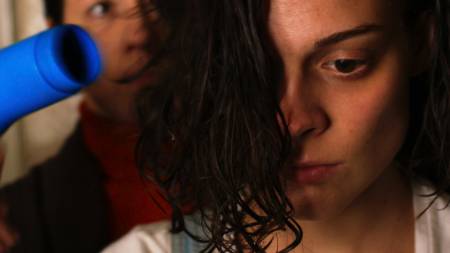
A dose of family, in bright boxy color
Balagov's colorful intensity forces itself upon us from the start. The opening scene is of a sister and brother, whose flirtation and dirty talk may define the title for us: this is a world of family and tribal intimacy.
The title states a theme worked out narratively and visually in Balagov's intense, slow-moving film about a Jewish family in Russia. It's in squarish Academy ratio, which is claustrophobic in itself, with that effect amped up by intensifying the color of the images and making them mostly closeups, so close sometimes it's hard to see the people in the shots. The closeness is family and tribe. The opening scene is a too-intimate one between the grown brother and sister. The family is Jewish. She is a tomboy who works in their father's garage and prefers overalls. He is about to be married to his love, Lea. She has a secret lover, from an obscure tribe whom her parents might not approve of and who might not approve of her. They meet clandestinely, often in a car. Then her brother and Lea are kidnapped and held for ransom. The Jewish community, led by the rabbi, are unable to raise all the ransom money. They decide to sell the garage and its contents and this will mean they will have to move. The are constantly moving and they had begun to fit in, but that's over. Only when the brother comes back the issue becomes: will he go with the family? Will Lea? Will his sister?
All of this matters so intensely that it pushes all else away, each one thing occupying the small crowded box of the screen at a time and making it seem as if there is nothing else. Thus Balagov captures the beauty and oppression of a rich ethnic family life in a small, encroached-upon tribal community struggling to exist against the world.
Many including audience members at the Cannes Un Certain Regard original screening of this film have objected to the use of a real "snuff film," showing Russians being threatened, tortured, and killed, which goes on for several minutes. This is just the most oppressive and drawn-out passage of a film that tends, for some of us, to feel oppressive and drawn-out for much of its nonetheless distinctive and in its own way beautiful run-time.
Reviewed by Jessica Kiang as part of Un Certain Regard at Cannes in Variety: "An ethically indefensible choice mars Russian first-timer Kantemir Balagov’s otherwise impressively tough-minded debut," she began, pointing to the use of what might be considered a real 'snuff film' in its contents. "Even without its most controversial segment," Kiang said, this is "a demanding, difficult watch, presents an unavoidable [ethical dilemma}" whether to consider this inclusion remotely acceptable, of at midpoing a lengthy excerpt from a "scratchy and degraded VHS tape" of the kind we know from ISIS, of "anti-Semitic Islamist violence and murder." Tara Brady of The Irish Times explains it is "actual footage from the 1999 Dagestan massacre - in which Chechens torture Russian soldiers.". "the sequence goes on for a long time," Kiang writes, and the press notes indicate its not just realistic but real. .
Closeness is a tough-minded, rigorously composed, quite brilliantly acted story of the challenges of everyday religious prejudice and ethnic divides in the bleak heart of Russia’s North Caucasus, and in many ways Balagov’s uncompromising but stylized social realism rewards as much as it punishes. But in including this real video — essentially a snuff movie — within a fiction narrative and not announcing it as such, a line is crossed. . ." But Tara Brady concluded with: "A divisive and discombobulating new talent has arrived on the Croisette."
Closeness/Tesuta 118 mins., debuted in Un Certain Regard at Cannes May 2017. Opened theatrically in France, very well received (AlloCinÚ press rating 4.1) Reviewed as part of New Directors/New Films, FSLC and MoMA, Mar. 2018.
Showtimes:
Saturday, March 31, 4:30pm [MoMA]
Sunday, April 1, 4:30pm [FSLC]
Last edited by Chris Knipp; 02-24-2019 at 12:50 PM.
-
SCARY MOTHER /SASHISHI DEDA (Ana Urushadze 2018)
ANA URUSHADZE: SCARY MOTHER/SASHISHI DEDA (2017)
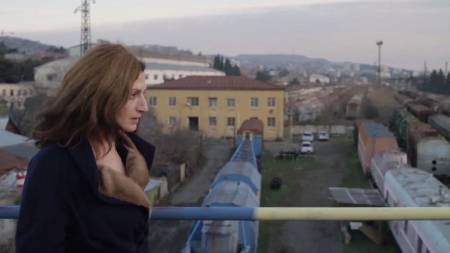
NATO MARVANIDZE IN SCARY MOTHER
Genius and madness are often linked, perhaps because genius is outside the norm. Plain folks may not understand it. When a brilliant writer approaches the surreal, who can follow? One of the accomplishments of Georgian director Ana Urushadze's debut feature is the way we remain unsure to the end of the middle-aged mother working on a troubling manuscript, expressing a long-repressed desire to write, has lost it, as her conventional husband says, or is creating a work of incomparable originality, as her friend the stationary store owner fervently believes.
Her husband says in the opening scene that his wife looks disheveled and worn out. Yes, she does, a bit; but throughout she is capable of maintaining an upright, elegant look as well. Urushadze maintains a nice level of clarity and a firm narrative line. Much credit is due also to Ramaz Ioseliani, the admirable actor playing Nukri, the stationary store owner, who not only champions Manana (Nato Murvanidze), but sets up a room for her in the back of his store as a retreat - and he has no ulterior motives. He really is trying to find Manana a publisher, and nurturing what he feels is an extraordinary new work of literature.
Anri (Dimitri Tatishvili), Manana's upright spouse, thinks what she has written is extreme pornography. So do some of the publishers who have looked at her 150 finished pages (she has to find an ending). But didn't they say that about Henry Miller and William Burroughs?
To us Manana may seem crazy at times, certainly. But isn't that because she is in the white heat of creative fervor?
Urushadze makes her film turn more and more into a thriller, a mystery, and a chase, admirably speeding up the tension. She introduces a fourth hand in the game: Jarji, Manana's father, who is translating the manuscript, without knowing yet that it is hers. He is played by the quite extraordinary Avtandil Makharadze, who builds up a maniacal energy of his own. Meanwhile Manana has three handsome children, two boys and a girl, all upright and fine. Where does her explosion of creative power come from? Jarji, no doubt.
The film was reviewed at Antalya Film Festival (competing) by Jessica Kiang in Variety. She described the theme of Urushadze's "darkly daring debut" as " A middle-aged Georgian woman finds freedom, ferocity and freakiness in writing her first novel" and noted, "The vast, largely unmapped terrain of a middle-aged mom’s creative life gets a witchily weird, uncompromisingly assured showcase in Georgian director Ana Urushadze’s exhilaratingly offbeat oddity. [The film's] cerebral chilliness, emotional remove and narrative abstruseness might make it a hard sell in that context. . .this is nevertheless a startling debut that wholly earns its place as standard-bearer for one of the most exciting and distinctive national cinemas to have emerged in recent years." This is indeed a fresh and original and well-made film.
Scary Mother/Sashishi Deda, 107 mins.,debuted at Locarno, won a prize at Sarajevo, also at Atalya, and was, not surprisingly, Georgia's Best Foreign Oscar entry for 2018. Screened for this review as part of FSLC and MoMA's New Directors'/New Films series, March 2018.
ND/NF showtimes:
Saturday, March 31, 9:00pm [FSLC]
Monday, April 2, 6:00pm [MoMA]
Last edited by Chris Knipp; 03-15-2018 at 08:31 PM.
-
AN ELEPHANT SITTING STILL (Hu Bo 2018)
HU BO: AN ELEPHANT SITTING STILL (2018)
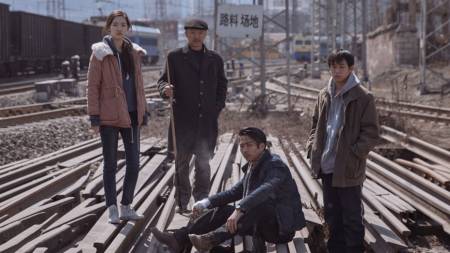
WANG YUWEN, LI CONGXI, YU ZHANG, AND PENG YUCHANG IN AN ELEPHANT SITTING STILL
Extraordinary first film, by a young director too soon lost
This four-hour, intimate, almost real-time epic follows several people of different ages at the end of their tether who converge finally at the train station heading for the same escape, the city of Manzhouli where they say an elephant simply sits and ignores the world. The style made me, like others, think both of Edward Yang (A Brighter Summer Day) and Jia Zhang-ke (Unknown Pleasures), and this profound, ambitious work of an impressive new filmmaker takes on a tragic resonance because he committed suicide, at 29, so all this promise will never be realized again. A sad astonishment.
Reviewed at Berlin in Hollywood Reorter by Clarence Tsui: "An Elephant Sitting Still began with a myth — and ended up becoming a myth itself. Revolving around four characters shaken out of their small town stupor by an enigmatic tale about a lethargic pachyderm, the film attained instant cult status among critics at the Berlinale, where it premiered in the Forum sidebar, because of the suicide of its 29-year-old novelist-turned-director Hu Bo last October." Tsui notes a debt to s Krzysztof Kieslowski and Bela Tarr for its fatalistic worldview and "omnipresent tracking shots."
Another reviewer (actually several, the present writer included) saw elements of Edward Yang and Jia Zhangke. Tsui adds, "Elephant isn’t exactly the film maudit suggested by the difficult circumstances from which it emerged. Long and a bit unwieldy, and self-consciously philosophical in parts, yes, but Hu's first (and sadly last) feature weaves together its narrative threads clearly and sturdily." In Sight and Sound Giovanni Marchini Carnia calls the film "A shattering, soul-searching debut (and one-off)."
Writing for the site Filmstage from Berlin, Zhuo-Ning Su makes some astute observations about this film's strengths and weaknesses, notably how the director "writes microscopically, detailing the characters’ circumstances and choices at every turn, but addresses at the same time something on a much larger scale–an ancient civilization slowing losing its human touch." Zhuo-ning uses some marvellous phrases, calling the film a "grand tapestry of sorry." He's also right on the film's faults, that the "time element" may not be well-considered, making too much happening on the same day, and the "intellectual exposition," the expressions of the hopelessness and meaningless of existence, are unnecessarily repetitive. I simply find the film visually unsatisfying at some points, and too murky in the interiors by half. The much-admired long takes and long tracking shots might have been curtailed, in the interests of economy and toward the achievement of a more manageable run-time. But great talents are sometimes unwieldy and hard to contain.
In any case, the film and the stories it tells haunt you.
The way the camera doggedly, but deftly, follows the people around is somehow both obsessive and calm. In classic fashion, it is an eye: you are there. The world around is indifferent, yet penetrated with violence, cacophonous. It's nowhere and everywhere in contemporary China, dreary, vast, in rapid flux yet somehow also deserted-seeming. There is violence and indifference everywhere.
The narrative follows four main characters. There is a family that wants to put the grandfather, Lao Jin (Congxi Li), a retired man who doesn't look very old and is perfectly agile, into a home for the aged to make more space. And this man loses his dog when it is attacked by another dog that causes its death. A teenage boy, who emerges as the main protagonist, is Wei Bu (Peng Yuchang), a 17-year-old who stands up for himself and his buddy against the menaces and accusations of the local school bully, which results in a shoving match and the bully's fall down a cement stairway, apparently leaving him dead. Wei Bu's classmate and crush, Huang Ling (Wang Yuwen), is dating the married vice-principal to escape from her cruel mother. Yu Cheng (Yu Zhang), a slick, goodlooking petty hoodlum type, in the area and vaguely connected to the others, we learn later has slept on this momentous day with his best friend's girl, and sees his best friend jump to his death when he knows. The neatly woven action eventually brings these four people together on the way to Manzhouli.
Elephant Sitting Still, 234 mins., debuted at the Berlinale. Also shown at New Directors/New Films, where it was screened for this review. The late filmmaker, a Beijing Film Academy graduate, had also directed a couple of award-winning short films and published two novels.

HU BO
Last edited by Chris Knipp; 01-24-2020 at 12:12 AM.
-
COCOTE (Nelson Carlo de los Santos Arias 2017)
NELSON CARLO DE LOS SANTOS ARIAS: COCOTE (2017)
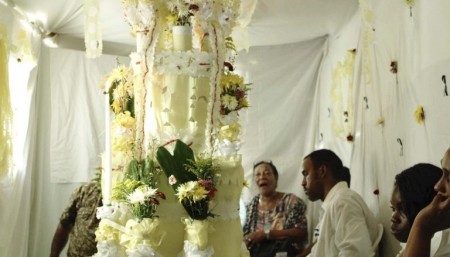
A clash of images and rituals
The Dominican filmmaker Nelson Carlo de los Santos Arias is drunk on sound and images. He enjoys sliding between color and black and white and different size formats, between still, wide pans and uptight agitated coverage of intense local gospel meetings amped by drum beats, depicting a clash of Catholicism and West African mysticism.His use of sound early and late in Cocote, his debut feature, isn't just ethnographic but radical and dramatic. In purely cinematic terms the viewer shares the intoxication of this interwoven ethnic, ritual, and visual blend - until it begins to clog the intended narrative a bit. Because there is a narrative, and an intensely driven, even if blocked one.
Alberto (Vicente Santos), the stifled, conflicted protagonist, a tall, awkward black man, is a gardner on a wealthy estate. He is also an evangelical Christian. We see only the wide, distant shot of the very large pool, which bookends the film. News of his father's death takes him to his rural "pueblo." Here he learns his father has been brutally murdered, decapitated, probably by a policeman. He is moved to revenge. But that goes against his Christian faith. So does the requirement that he attend pagan ceremonies rooted in Dominican Vodou that are part of the local obsequies for his father.
Never mind that Alberto is blocked morally and emotionally. The film itself is sidetracked by a wealth of documentary footage of those ceremonies and of impassioned, repetitive preaching that the director must have, understandably, thought too good to leave out, but somehow does not have quite the skill to include and still maintain narrative rhythm and suspense.
The synthesis of ethnographic documentary and scripted drama is an intoxicating but uneasy one. There is a situation here, more than a plotline. The real locations and people never cease to feel alive and exotic, but the revenge story keeps getting submerged, and it doesn't feel right. But it isn't entirely wrong either, though: Alberto is being urged to revenge by his family, but it goes strongly against his gospel Christianity, so he really is stuck. Perhaps if Alberto were stronger as a character all this would work better. As it is, as a first feature by a previous maker of a documentary and several shorts, this is a promising sign of ambition and passion that's been justifiably compared to the films of Glauber Rocha and fiction of Roberto Bola˝o.
Cocote is a study of class and power. After an hour of glorious images, documentary vibrancy, and narrative stagnation, Alberto meets up with someone who may be his father's killer, a cop who explains that helps but means nothing against the powerful. It sounds as violent a world as anywhere in Latin America, as Mexico among the cartels.
The climax feels rushed into the last fifteen minutes - though there is a beautifully ironic, and differently documentary, final sequence of rich folks talking falsely sociable nonsense around that big pool.
Cocote, 107 mins., debuted at Locarno Aug. 2017 in the Signs of Life section, winning the Best Film Award, and the film has been in a half dozen other international film festivals, including Toronto, Hamburg, Mar del Plata and Miami. It was screened for this review as part of the 2018 edition of the Museum of Modern Art-Film Society of Lincoln Center series, New Directors/New Films. A Grasshopper Film release.
In New Directors/New Films:
Tuesday, April 3, 6:15pm [FSLC]
Wednesday, April 4, 8:15pm [MoMA
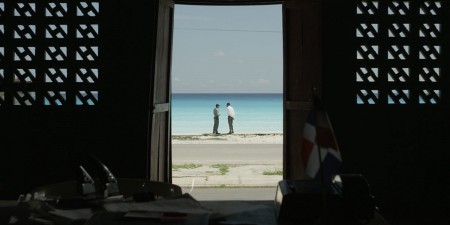
Last edited by Chris Knipp; 04-01-2018 at 05:39 AM.
 Posting Permissions
Posting Permissions
- You may not post new threads
- You may not post replies
- You may not post attachments
- You may not edit your posts
-
Forum Rules





 Reply With Quote
Reply With Quote








Bookmarks